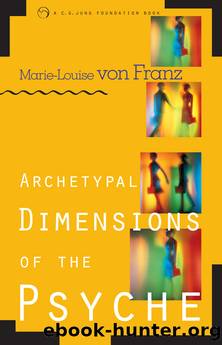Archetypal Dimensions of the Psyche by Marie-Louise von Franz

Author:Marie-Louise von Franz [Franz, Marie-Louise von]
Language: eng
Format: epub
Tags: Psychology, Movements, Jungian, Social Science, Folklore & Mythology, Interpersonal Relations
ISBN: 9780834829787
Google: IcHlBAAAQBAJ
Publisher: Shambhala
Published: 1999-02-16T20:49:59+00:00
General Psychological Conclusions
It has become palpable at various points in our interpretation that this fairy tale about the âblack womanâ could compensate for a collective attitude of consciousness connected with Christianity.106 Let us now briefly go over its most important features. In the lower strata of the people the lack of a mother image makes itself felt,107 and unfavorably against the feminine in this situation stands a masculine, habitual attitude. In the upper layers of society, behind the scenes, an image of woman gone negative is dominant. In the collective unconscious itself at the same time there is a dark mother imago, encapsulated and cut off from all its vital functions. The castle hidden in the forest indicates, for the dating of the fairy tale, a period following the Middle Ages, for although magic and witchcraft were condemned during the Middle Ages, they were not forgotten. Here, however, a content is reflected of which nothing whatever is known any longer. The past âcurseâ under which the black woman labors could well refer to the medieval witch hunts. Thus we are justified in dating the tale between 1500 and 1800 and placing it in Christian Europe. Since it deals with the reign of a still young king, we might narrow the time down more precisely to the beginning of the era of rationalism, which represents a masculine spiritual heritage of the Middle Ages, in the beginning period of which the forgetting of the dark mother takes place. The beginning of rationalism was not consciously anti-Christian in orientation,108 and as a result there was no crisis in the succession of the kingâs lineage, but there was a transformation in the realm of the feminine, both of the anima and the real woman.109 There, the archetypal background was forgotten, and at the same time a crisis began to take shape that was only later to reach the threshold of consciousness.
In the action of the tale, not only is this problem of a past time reflected, but at the same time a development is anticipated, which we are only beginning to realize consciously today. We are speaking of a transformation in the attitude toward the feminine, which first became visible in the field of the collective consciousness in phenomena like womenâs emancipation, in other words, not until around 1900.110
Therefore it seems of essential significance that this tale was diffused in Christianity-tinged variants and is even more well known in those forms than in the one presently under consideration, and that in them the âblack womanâ is for the most part equated with the Virgin Mary. This must express a perception on the part of the people, who sensed that this black or green woman really represented a mother goddess, whom one could of course only identify with the Mother of God. Conversely, however, the particular popularity of âblack madonnasâ seems to suggest a longing for a more earthy, darker form of this mother imago. The name given to the figure in a Russian variant seems to be particularly revealing in this respect.
Download
This site does not store any files on its server. We only index and link to content provided by other sites. Please contact the content providers to delete copyright contents if any and email us, we'll remove relevant links or contents immediately.
The Art of Thinking Clearly by Rolf Dobelli(10456)
Mindhunter: Inside the FBI's Elite Serial Crime Unit by John E. Douglas & Mark Olshaker(9324)
Change Your Questions, Change Your Life by Marilee Adams(7762)
Nudge - Improving Decisions about Health, Wealth, and Happiness by Thaler Sunstein(7694)
Mastermind: How to Think Like Sherlock Holmes by Maria Konnikova(7324)
The Power of Now: A Guide to Spiritual Enlightenment by Eckhart Tolle(5760)
Men In Love by Nancy Friday(5234)
Altered Sensations by David Pantalony(5094)
Factfulness: Ten Reasons We're Wrong About the World – and Why Things Are Better Than You Think by Hans Rosling(4737)
The Confidence Code by Katty Kay(4251)
Thinking in Bets by Annie Duke(4218)
Man and His Symbols by Carl Gustav Jung(4131)
The Worm at the Core by Sheldon Solomon(3486)
Why Buddhism is True by Robert Wright(3447)
Liar's Poker by Michael Lewis(3442)
Three Women by Lisa Taddeo(3425)
The Inner Life of Animals by Peter Wohlleben(3311)
Descartes' Error by Antonio Damasio(3271)
How Music Works by David Byrne(3262)
